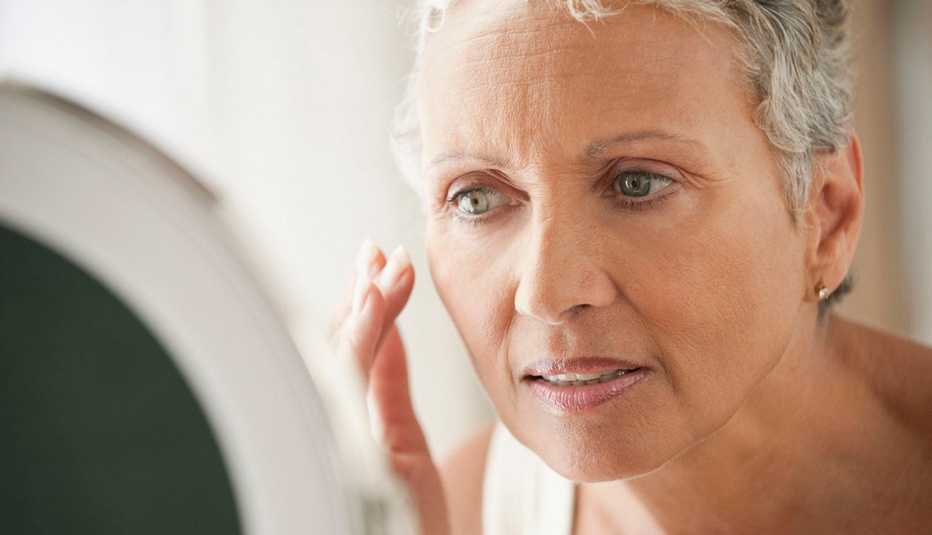Staying Fit


It’s normal for skin to change as you age: It becomes thinner, loses its sense of smoothness and may develop wrinkles and age spots. While you can’t slow the march of time, you can take steps now to protect your skin and help restore a youthful glow.
“Your skin can repair itself at any age,” says Lauren Ploch, M.D., a board-certified dermatologist in Augusta, Georgia, and Aiken, South Carolina. “It’s these little things that people don’t realize can make a world of difference in two, five or 10 years.”


AARP Membership— $12 for your first year when you sign up for Automatic Renewal
Get instant access to members-only products and hundreds of discounts, a free second membership, and a subscription to AARP the Magazine.
Taking care of your skin won’t just help you look more youthful; it could also save your life. Skin cancer is the most common cancer in the United States: Roughly 9,500 Americans are diagnosed with it every day, and about 1 in 5 are expected to develop it during their lifetime, according to the American Academy of Dermatology. And rates of melanoma — the deadliest form of skin cancer — have increased among older adults in recent years.
Making a few lifestyle changes — and altering harmful behaviors — can help protect you from cancer and slow the aging process. Start by avoiding these eight bad habits.
Bad habit 1: Skipping a daily dose of SPF
It doesn’t matter if the only time you go outside is to get the mail, dermatologists say: It’s still important to apply a broad-spectrum sunscreen to your face, neck, chest, hands — all areas of exposed skin — every day. Most of the sunlight damage in a person’s lifetime occurs during everyday activities such as driving to work, picking up the newspaper and walking the dog, says John Wolf Jr., M.D., chair of the Department of Dermatology at the Baylor College of Medicine.
“It’s not all playing golf, tennis, sunbathing and skiing,” Wolf says. “Remember, the sun comes through the windshield of your car and through windows” at your home and workplace.
Dermatologists recommend mineral-based sunscreens that use zinc oxide or titanium dioxide to block the sun rather than those that use chemicals, which can irritate your skin. If you’re spending time outside, make sure you reapply about every two hours, or after swimming or sweating.
Regular daily use of an SPF 15 or higher sunscreen reduces the risk of developing melanoma by 50 percent, according to the Skin Cancer Foundation. And if a fear of skin cancer isn’t enough to convince you to reach for the sunscreen, consider how it can affect your appearance: A study published in Annals of Internal Medicine found that women who used a broad-spectrum sunscreen daily had no detectable increase in skin aging after four and a half years compared to those who used it only occasionally.
“I put my sunscreen by my toothpaste, so I see it and put it on automatically every day,” Wolf says.
Bad habit 2: Smoking
Add this to the ever-growing list of reasons to give up cigarettes: A raft of research shows smoking accelerates premature aging of the skin. Over time, smokers are more likely to experience dry skin, uneven skin pigmentation, baggy eyes, a saggy jawline, and deep facial wrinkles and furrows. “It has been observed that the skin of smoking addicts at the age of 40 years resembles skin of nonsmoking 70-year-old adults,” wrote the authors of one published review.
Smoking also slows the body’s ability to heal itself and increases your chance of a skin infection, plus it boosts overall inflammation in your body, says Heather Holahan, M.D., a dermatologist at UCLA Health in Santa Monica, California.
Meanwhile, the carcinogens in cigarette smoke significantly increase your risk of developing a variety of cancers, including skin cancer.




































































More on Health
Can You Safely Get Vitamin D From the Sun?
A few minutes in the sun might have benefits, but risks include skin cancer, wrinkles
7 Skin Conditions That Need Medical Attention
They may not signal skin cancer, but they could still spell trouble
8 Superfoods for Aging Skin
Get your glow back with these nutrient dense, antioxidant-rich foods